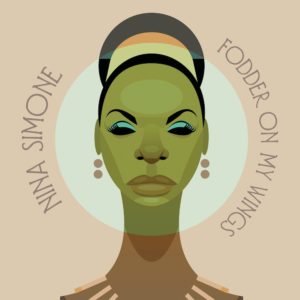Nina Simone
Fodder on My Wings [reissue]
Verve
9/10
What an odd and beautiful surprise this new reanimation of Nina Simone’s 1982 LP Fodder on My Wings is. Its freshly re-tuned sound is as boldly eccentric as the haunted Simone’s well-heeled frustrations. Its added tracks are all contextual red meat—no gristle or fat. And its re-release, in this fashion, closes a gap that never quite sat well with lovers of the Nina canon.
Simone’s sole recording for Creed Taylor’s funky jazz label CTI, 1978’s Baltimore was a wonky period piece with its string-heavy arrangements, thick background vocals, soul-pop songs from Daryl Hall and Randy Newman, and touches of reggae—a thoroughly mesmerizing and confusing album that probably paved a crooked path in regard to her next studio album, Fodder. Or would that wind up as a righteous, self-serving path to Fodder’s full-blown take on an Etch-a-Sketchy schematic?
The (mostly) Simone-penned Fodder on My Wings had its half-baked moments, but, in effect, was full-blooded, funny, dejected, cutting, and truly liberating. Whatever she wanted, whatever she heard in her head—that’s how she sounded. It might be sorrowful, at times, but Fodder on My Wings is never regretful.
Recorded in Paris with a small instrumental outfit of singing rhythm players (bassist Sylvin Marc, percussionists Paco Sery and Sydney Thaim) and produced with Giancarlo Cerri and Yves Chamberland, Simone played piano and harpsichord, arranged her own soulful compositions, and morphed the stately sound of her classical studies in Philadelphia past with her then-current travels through Europe and the Caribbean—and of course, the blues. Living her best and freest life, Fodder was truly her declaration of independence, of no compromise. And her actor-ish voice—often gruff, often silken, always bruised and doubly proud—is the whispered, cackled, crooned, and howling amplification of such freedom.
Going from delicate, somnolent, holy ballads such as “Il Y a un Baume à Gilead,” to hypnotic satirical jazz blips like “Color Is a Beautiful Thing,” to the journeyman soul of the title tune—why not. The spirituality of the former was given no less and no more passion in its performance than the latter.
Though it still toyed with Baltimore’s blurry island musics, Fodder’s jittery “Liberian Calypso” is a wild, free dance of abandon and glee. Her choice in time-sensitive, hammy cover tunes—an unaccompanied “Alone Again Naturally” from Gilbert O’Sullivan—is a stark, bottomed-out declaration of loss directed toward the family events that shaped her life. Spirituality isn’t always portrayed in shades of white and gold. On the dusky “Thandewye,” her tone is red, rimmed with black, and the mood is as rattled as it is godly.
Looking backwards to being deceived by her family, her record labels, and her teachers, Simone’s boisterous, blue “They Took My Hand” and “I Was Just a Stupid Dog to Them” portray a woman who will not suffer fools or folly any longer. “It is finished, because I’m too wise,” she coughs. The album’s anthemic opening number, “I Sing Just to Know That I’m Alive,” touches on the delight of self-belief and empowerment, certainly, but its joys and pain—like all the mixes of joy and pain on this album—is akin to cutting oneself in order to feel something. Anything. That’s the story of Fodder: rich in its dynamics and dichotomies, proud of what it is and where she was going.









